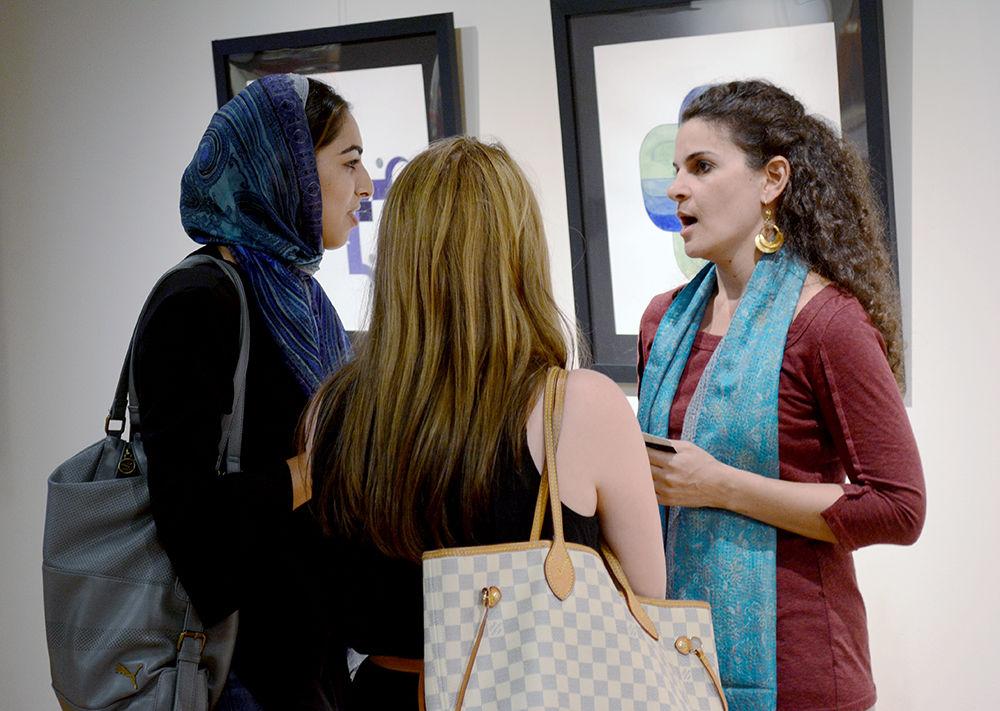 " />
" />
Emma Dimig
Alumna Madiha Malik and Sasha Abed talk with artist Joumana Medlej after a presentation of Medlej's artwork. The presentation entitled "Art in Times of Crisis" took place on Thursday at the Craft Center. Medlej is a Lebanese artist who includes Kufi calligraphy, the first great Arabic script, in her work.
Thursday night, Lebanese artist Joumana Medlej spoke about her experience with diaspora art and expression at the Crafts Center and showcased a selection of her work to the audience. The brief talk, titled “Art in Times of Crises,” was followed by a Q&A session, and is part of the the Khayrallah Center’s Lebanese artist-in-residence program for 2017.
Medlej, who spent the week in workshops introducing students to techniques of Arabic calligraphy, is an apprentice of Lebanese poet and modernist artist Samir Sayegh. She moved to London from Lebanon five years ago. Her initial training in design and experience with illustrations influence and guide her style.
To Medlej, artists choose to respond to disastrous events, such the current refugee crisis, in one of three ways. The can choose to withhold from participating in the dialogue, directly respond and address the issue, or indirectly respond to it. She included examples from artists such as Picasso, Banksy and Ai Weiwei in her presentation.
“Sometimes, an artist might feel that the most appropriate response is to withhold their creativity, to just shut it down…,” Medlej said. “However, in this time, when everybody has something to say about anything, and social media is saturated with personal opinions, choosing not to add to the noise is not really a contribution.”
In her talk, Medlej touched on the subject of manipulation and propaganda in art. She emphasized the responsibility that falls on artists who participate in protest and political art to be aware of the outcomes of their direct response to the audience’s perception of a crisis.
“Art is important in this field because news is one thing, information is one thing, but art has the ability to bypass the mind and to speak to our emotions,” Medlej said. “It can bring things up from the dead. One image, one piece of music can get to the very essence of the crisis… One thing that is not talked about enough is the responsibility that comes with it, because there is a dark side to this. When you can speak to somebody’s emotions and not their mind, you can make them believe anything and that will stick.”
Jazzlyn Hill, a fourth-year studying biological sciences and sports science, attended the event. She found the talk interesting, as it helped her interpretation of the artist’s works.
“I think it gave really good insight,” Hill said. “I’ve never really been to anything where an artist has spoke … So, it was really cool to hear her thoughts on, and see her explain, her work. It was also very interesting to hear about the indirect ways that people show in times of crisis, because I feel like most people don’t think about that. They only think about what she said is the direct effects and not the indirect effects, and I thought that was very cool.”
Hill’s favorite pieces in the exhibit were of different illustrations of Arabic words that translated to love in English on vibrant backgrounds that she described as deep.
As for technology, Medlej finds a balance between using digital tools and traditional methods to create her works and achieve the results she is looking for.
“They are all tools, that’s the thing,” Medlej said. “As long as you’re not a slave to the tool, it’s just very easy. For instance, in my process, I use the computer a lot, but it’s one tool in the process. I sketch by hand, I have a pile of sketchbooks. And, when I find the design, I go to the computer to check that it works, because my geometry is very precise that the hand-made sketch sometimes can be misleading.”
As its next event, the Moise A. Khayrallah Center for Lebanese Diaspora Studies will be hosting a film screening of Dalya’s Other Country on Monday, Oct. 9. Co-producer Moustafa Zeno will be at the screening. For more information about future events, visit the Khayrallah Center website.